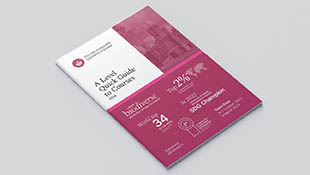-
Courses

Courses
Choosing a course is one of the most important decisions you'll ever make! View our courses and see what our students and lecturers have to say about the courses you are interested in at the links below.
-
University Life

University Life
Each year more than 4,000 choose University of Galway as their University of choice. Find out what life at University of Galway is all about here.
-
About University of Galway

About University of Galway
Since 1845, University of Galway has been sharing the highest quality teaching and research with Ireland and the world. Find out what makes our University so special – from our distinguished history to the latest news and campus developments.
-
Colleges & Schools

Colleges & Schools
University of Galway has earned international recognition as a research-led university with a commitment to top quality teaching across a range of key areas of expertise.
-
Research & Innovation

Research & Innovation
University of Galway’s vibrant research community take on some of the most pressing challenges of our times.
-
Business & Industry

Guiding Breakthrough Research at University of Galway
We explore and facilitate commercial opportunities for the research community at University of Galway, as well as facilitating industry partnership.
-
Alumni & Friends

Alumni & Friends
There are 128,000 University of Galway alumni worldwide. Stay connected to your alumni community! Join our social networks and update your details online.
-
Community Engagement

Community Engagement
At University of Galway, we believe that the best learning takes place when you apply what you learn in a real world context. That's why many of our courses include work placements or community projects.
Mental Health Nursing
Course Overview
This four-year programme, offered in partnership with the Health Service Executive West, leads to the award of Bachelor of Nursing Science (Mental Health Nursing) and eligibility for registration in the Psychiatric Division of the Nurses’ Register, maintained by Nursing and Midwifery Board of Ireland (NMBI), the nursing profession’s regulatory body.
The BSc. (Hons) in Mental Health Nursing will provide students with knowledge, skills, attitude, and professional behaviours necessary to provide high quality care and competent nursing practice in an ever-changing health care environment.
Mental Health Nursing aims to assist in the recovery of people experiencing mental health issues and to promote mental health and wellbeing. At the heart of mental health nursing is the development of therapeutic relationships, engaging with service users, their carers and their families.
Applications and Selections
Who Teaches this Course
Requirements and Assessment
Key Facts
Entry Requirements
Minimum Grade H5 in two subjects and passes in four other subjects at O6/H7 level in the Leaving
Certificate, including Irish, English, Mathematics, a laboratory science subject (i.e., Chemistry, Physics, Biology, Physics with Chemistry (joint) or Agricultural Science), and any two other subjects recognised for entry purposes.
Additional Requirements
Recognition of Prior Learning (RPL)
Duration
4 years
Next start date
September 2024
A Level Grades (2023)
universityofgalway.ie/alevels
Average intake
30
QQI/FET FETAC Entry Routes
Closing Date
NFQ level
Mode of study
ECTS weighting
Award
CAO
GY516
Course code
Course Outline
Year 1
- Foundations of Mental Health Nursing
- Research and Evidence for Practice 1
- Introduction in Mental Health Nursing
- Mental Health Nursing 1
- Communications & interpersonal skills
- Health and Applied Biosciences
- Clinical practice 1 & 2
- Practice assessment
Year 2
- Research and Evidence for Practice 2
- Health and Applied Biosciences II
- Applied Psychology of Nursing and Midwifery
- Sociology of Health and Healthcare
- Mental Health Nursing 2
- Mental Health Nursing 3
- Mental Health Nursing 4
- Clinical Practice 3 & 4
- Practice Assessment
Year 3
- Law and Ethics
- Medicines and Clinical Practice
- Elective
- Mental Health Nursing 5
- Mental Health Promotion and Recovery
- Mental Health Nursing 6
- Clinical Practice 5 & 6
- Practice Assessment I and II
- Mental Health Nursing 7
Year 4
- Leading and Developing Practice
- Transition to Practice
- Research Project
- Clinical Practice 7
- Clinical Internship Assessments 1, 2, 3 & 4
- Practice Assessment
- Clinical internship which runs over 36 weeks - Semester II
Curriculum Information
Curriculum information relates to the current academic year (in most cases).Course and module offerings and details may be subject to change.
Glossary of Terms
- Credits
- You must earn a defined number of credits (aka ECTS) to complete each year of your course. You do this by taking all of its required modules as well as the correct number of optional modules to obtain that year's total number of credits.
- Module
- An examinable portion of a subject or course, for which you attend lectures and/or tutorials and carry out assignments. E.g. Algebra and Calculus could be modules within the subject Mathematics. Each module has a unique module code eg. MA140.
- Subject
- Some courses allow you to choose subjects, where related modules are grouped together. Subjects have their own required number of credits, so you must take all that subject's required modules and may also need to obtain the remainder of the subject's total credits by choosing from its available optional modules.
- Optional
- A module you may choose to study.
- Required
- A module that you must study if you choose this course (or subject).
- Required Core Subject
- A subject you must study because it's integral to that course.
- Semester
- Most courses have 2 semesters (aka terms) per year, so a three-year course will have six semesters in total. For clarity, this page will refer to the first semester of year 2 as 'Semester 3'.
Year 1 (60 Credits)
Required NU1107: Health & Applied Biosciences 1 - 10 Credits - Semester 1Required NU1116: Introduction to Mental Health Nursing - 5 Credits - Semester 1
Required NU1111: Foundations of Mental Health Nursing Practice - 10 Credits - Semester 1
Required NU1119: Clinical Practice 1 & 2 (Mental Health) - 15 Credits - Semester 1
Optional RPL005: Recognised Prior Learning - 5 Credits - Semester 1
Optional RPL010: Recognised Prior Learning - 10 Credits - Semester 1
Optional RPL015: Recognised Prior Learning - 15 Credits - Semester 1
Required NU1106: Practice Assessment 2 (PY) - 0 Credits - Semester 2
Required NU104: Placement Hours - 0 Credits - Semester 2
Required NU138: Practice Assessment (PY) - 0 Credits - Semester 2
Required NU1112: Research and Evidence for Practice 1 - 5 Credits - Semester 2
Required NU1114: Communication and Interpersonal Skills - 5 Credits - Semester 2
Required NU1118: Mental Health Nursing 1 - 10 Credits - Semester 2
Year 2 (60 Credits)
Required NU2217: Mental Health Nursing 4 - 5 Credits - Semester 3Required NU2307: Clinical Practice 3 & 4 - 15 Credits - Semester 3
Required NU2214: Mental Health Nursing 2 - 10 Credits - Semester 3
Required NU2200: Health & Applied Biosciences 2 - 10 Credits - Semester 3
Optional RPL005: Recognised Prior Learning - 5 Credits - Semester 3
Optional RPL010: Recognised Prior Learning - 10 Credits - Semester 3
Optional RPL015: Recognised Prior Learning - 15 Credits - Semester 3
Required NU2202: Research and Evidence for Practice 2 - 5 Credits - Semester 4
Required NU225: Practice Asessment - 0 Credits - Semester 4
Required NU208: Specialist Placement Hours Module - 0 Credits - Semester 4
Required NU2215: Mental Health Nursing 3 - 5 Credits - Semester 4
Required NU2204: Applied Psychology for Nursing & Midwifery - 5 Credits - Semester 4
Required SP2118: Sociology of Health and Healthcare - 5 Credits - Semester 4
Year 3 (60 Credits)
Required NU3108: Mental Health Nursing 5 - 10 Credits - Semester 5Required NU3109: Mental Health Promotion and Recovery - 5 Credits - Semester 5
Required NU3110: Mental Health Nursing 6 - 5 Credits - Semester 5
Required NU3112: Clinical Practice 5 & 6 - 15 Credits - Semester 5
Required NU348: Practice Assessment 2 (PY) - 0 Credits - Semester 5
Optional RPL005: Recognised Prior Learning - 5 Credits - Semester 5
Optional RPL010: Recognised Prior Learning - 10 Credits - Semester 5
Optional RPL015: Recognised Prior Learning - 15 Credits - Semester 5
Required NU314: Elective - 5 Credits - Semester 6
Required NU3104: Law and Ethics - 5 Credits - Semester 6
Required NU3105: Medicines and Clinical Practice - 10 Credits - Semester 6
Required NU3111: Mental Health Nursing 7 - 5 Credits - Semester 6
Required NU399: Clinical Hours - 0 Credits - Semester 6
Required NU337: Practice Assessment - 0 Credits - Semester 6
Year 4 (60 Credits)
Required NU499: Clinical Hours - 0 Credits - Semester 7Required NU489: Internship Assessment 4 - 0 Credits - Semester 7
Required NU488: Internship Assessment 3 - 0 Credits - Semester 7
Required NU487: Internship Assessment 2 - 0 Credits - Semester 7
Required NU486: Internship Assessment 1 - 0 Credits - Semester 7
Required NU470: Practice Assessment - 0 Credits - Semester 7
Required NU4107: Clinical Practice 7: year 4 - 10 Credits - Semester 7
Required NU4106: Leading and Developing Practice - 10 Credits - Semester 7
Required NU4110: Literature Review - 20 Credits - Semester 7
Optional RPL005: Recognised Prior Learning - 5 Credits - Semester 7
Optional RPL010: Recognised Prior Learning - 10 Credits - Semester 7
Optional RPL015: Recognised Prior Learning - 15 Credits - Semester 7
Optional RPL020: Recognised Prior Learning - 20 Credits - Semester 7
Required NU4109: INTERNSHIP, General and Mental Health - 15 Credits - Semester 8
Required NU4108: Transition to Practice - 5 Credits - Semester 8
Further Education
There are a variety of continuing professional development opportunities available to graduates of this programme, in particular postgraduate programmes within the School of Nursing and Midwifery.
Why Choose This Course?
Career Opportunities
- In-patient mental health services
- Community mental health services
- Child and adolescent mental health services
- Forensic mental health services
- Voluntary organisations
- Recovery and rehabilitation services
- Services for the older person
- Substance misuse and addiction treatment services
- Primary mental health care
Work Placement
Clinical practice modules require students to complete clinical placements within the Health Service Executive West region. While on clinical placements, students will be supervised by an appropriately trained nurse. In accordance with Nursing and Midwifery Board of Ireland regulations, the total requirements of the programme are 144 weeks of clinical placement. Students undertake a 36-week clinical internship in semester two of year four. During the clinical internship period, students are paid a salary.
Who’s Suited to This Course
Learning Outcomes
Transferable Skills Employers Value
Work Placement
Students undertake a 36-week clinical internship in semester two of year four. Clinical practice modules require students to complete clinical placements within the Health Service Executive West region. While on clinical placements, students will be supervised by an appropriately trained nurse. In accordance with Nursing and Midwifery Board of Ireland regulations, the total requirements of the programme are 144 weeks clinical placement. During the clinical internship period, students are paid a salary.
Study Abroad
Related Student Organisations
Course Fees
Fees: EU
Fees: Tuition
Fees: Student Contribution
Fees: Student levy
Fees: Non EU
*EU Fees are comprised of Tuition + Student Contribution Charge + Student Levy
Student Levy: €140 - payable by all students and is not covered by SUSI. Further detail here https://su.nuigalway.ie/
Find out More
Dr Siobhan Smyth, Programme Director
School of Nursing and Midwifery, Aras Moyola, University of Galway.
E Siobhan.smyth@universityofgalway.ie
T 091 492832
What Our Students Say

Laura Greene | Mental Health Nursing (Final year, 4th year)
I enjoyed the practical side of learning. Throughout the four year degree, I worked in a vast amount of clinical areas. I gained a lot of exposure to various mental illnesses and I was able to gain a true understanding of how to care for someone with a mental illness. I enjoyed the workshops and the different speakers that came to University of Galway to speak to us about their clinical area. I enjoyed the variety of areas you can learn about in mental health from care of the elderly to working with children with mental health difficulties. Each area is so different and specialized and it gives students a great opportunity to branch out.

Ava Fowley | Mental Health Nursing
The Bachelor of Nursing (Mental Health) degree at University of Galway has offered a unique and important foundation for my nursing career. The University has provided me with the opportunity to discover my academic potential as well as enhancing my skills in becoming a qualified mental health nurse. I have met many inspiring people over the four years, both in class; on a student-to-student level and out on placement; on a student nurse-to-service user level. There is a great hub of support from the lecturers and staff in college to the clinical placement coordinators and staff members you meet out in the varied and interesting placement settings.

Martyna Zdzieblowska | Mental Health Nursing
Choosing a university was an important milestone, and I am glad I chose University of Galway for my university journey. The Mental Health Nursing programme offers a diverse range of clinical placements which provide a vast insight into what you can do with your nursing degree. Moreover, the state of the art building enables students to learn and practice their nursing skills in a clinical environment which is further supplemented by a great selection of books in the university library and the new computer suite. University of Galway has a great location right in the centre of the Galway, which offers great opportunity to have fun and explore the local area. The campus also offers several clubs and societies that allow you to meet with like-minded people and share interests which is an important part of the university experience.








.jpg)
.jpg)











